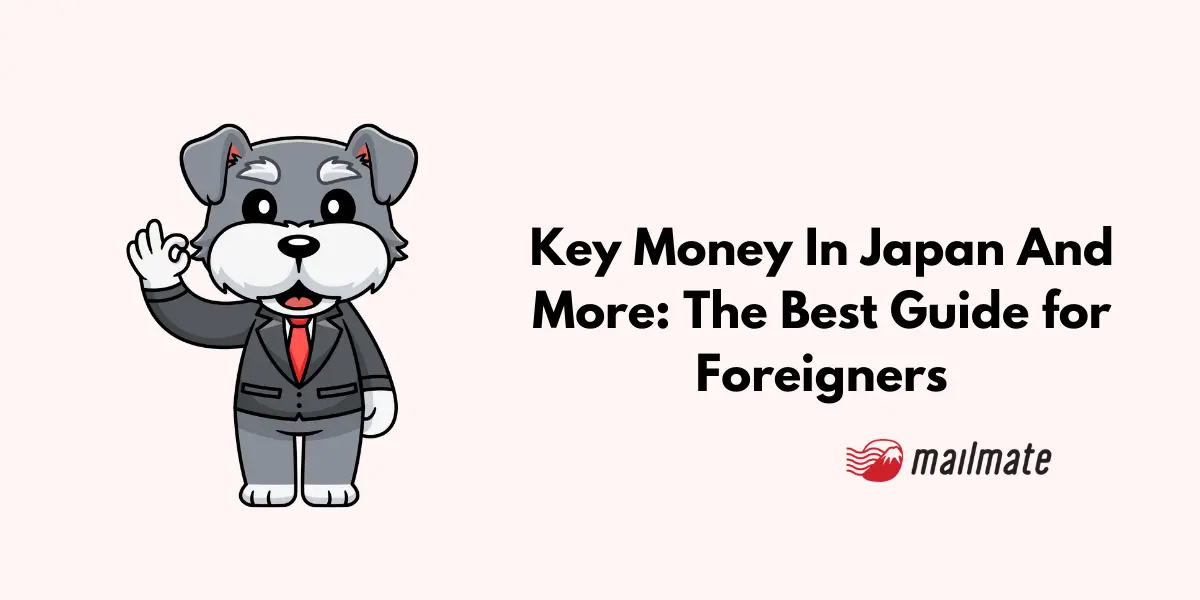Key Money In Japan And More: The Best Guide for Foreigners

Thinking about moving to Japan? Before you start packing, there are some hidden costs regarding your living arrangements.
This article will help you understand the financial costs of getting your own place in Japan.
Understanding key money in Japan

What is key money?
In Japan, key money is a one-time, non-refundable fee paid to landlords. The amount varies, but the total is about one to three months of total rent. But recently, there has been reikin-free rental housing available.
It is reikin (礼金) in Japanese, which translates to gratitude money. It acts as a thank-you gesture for letting you stay there.
Is key money negotiable?
The tenant or the real estate agent can attempt to negotiate the key money amount. However, the landlord has the final say.
And if multiple potential tenants want to stay at their property, the landlord will go for those likely to pay key money.
Do you get key money back in Japan?
This fee is not returned at the end of your leasing contract.
Is key money legal in Japan?
While it may not be common in your home country, key money is a regular practice in Japanese real estate. It is widely accepted and understood among the local population.
There are a couple of things to note. For one, it is usually attached to popular locations or newer, high-demand buildings.
And two, key money is not required for many places. Many real estate websites have options for you to filter out properties that don't need key money by clicking 礼金なし.

How key money affects renters in Japan
Having an extra one to three months of rent can be a financial burden.
Many renters will use real estate agents in Japan to negotiate key money and other costs down to keep your total moving cost low.
However, many properties don’t need key money. Instead, they may require a security deposit or have a monthly maintenance fee for the building.
Other Japanese apartment fees to know

Looking for an apartment or housing in Japan can be difficult when you are unfamiliar with the Japanese terms. So, here is a list of the most common Japanese apartment terms you will encounter.
a. Maintenance fee (管理費, kanrihi)
This monthly fee covers the general maintenance and upkeep of the common areas of the building. The cost usually depends on the property itself. It will be generally higher with properties with more facilities, such as a gym or mailing room.
While you can not avoid maintenance fees, you can add a search filter 管理費・共益費込み that will show you the total price of properties.
b. Security deposit (敷金, shikikin)
This term is more common than key money in the USA.
A security deposit, about one to two months of rent, covers any potential damage to the property. Any damages to the property will be deducted from the security deposit. You will receive the remaining cost once you have completely moved out.
You can filter out properties that require a security deposit by clicking 敷金・保証金なし.
c. Guarantor fee (保証人, hoshōnin):
Many landlords require guarantors to be co-signers to rental agreement properties. As a guarantor, that person will be responsible for the rent payment if the tenant can not pay it.
Despite the common belief that only foreigners need guarantors, many properties require young Japanese people to have guarantors. The difference is that many Japanese people will use their parents as co-signers, while foreigners will have difficulty finding one.
Depending on the situation, the real estate company assigns you a guarantor company, or you need to apply for one yourself.
To avoid this additional fee, you can filter out properties with the term 保証人不要 (hoshōnin fuyō).
d. Real estate agent fee (仲介手数料, chūkai tesūryō):
When using a real estate agent, there might be an agency fee that you will need to pay. This fee compensates the agent’s services for finding and closing the deal for the apartment for you.
It is usually about half a month or a month of rent.
e. Renewal fee (更新料, kōshinryō):
Many rental agreements in Japan are usually for two years. To renew your lease, tenants might have to pay a renewal fee, about one month of rent.
f. Fire insurance (火災保険, kasai hoken)
All tenants are required to buy fire insurance for their apartments. It covers damages from fires, water leaks, and sometimes personal liability. It may be part of your final fee or a separate item you purchase later.
In closing
While key money is an old practice in Japanese real estate, there are ways to avoid it. Searching for reikin-free properties, trying to negotiate with landlords, and understanding other costs will ease your financial burden. Plus, it will make your move to Japan smoother and more affordable.
Spending too long figuring out your Japanese mail?
Virtual mail + translation services start at 3800 per month. 30-day money-back guarantee.

